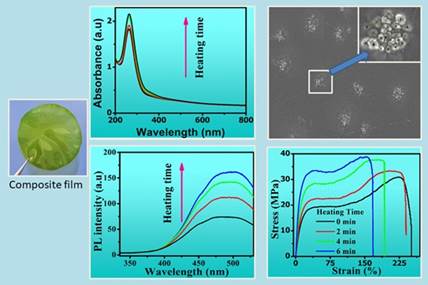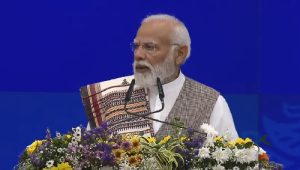Scientists fabricated optically active flexible biodegradable polymer-nanocomposite films
Researchers have fabricated an optically active biodegradable nanocomposite film with excellent mechanical properties that can be used as a stretchable optical devices like flexible display, flexible organic LED, etc.
Polymers have become an indispensable part of our daily life. However, different engineering applications demand highly flexible and optically active polymers. In this regard, numerous methodologies have been adopted to improve the properties of polymeric materials by using suitable nanomaterials. The nanomaterials are known to enhance the properties of the polymers keeping the inherent properties of the polymers intact. Scientists have reported that polyvinyl alcohol (PVA) is one of the most widely studied synthetic biodegradable polymers having good film-forming and excellent mechanical properties. Moreover, its optical and mechanical properties can be tuned by incorporating suitable nanomaterials.
A research group from physical sciences division of the Institute of Advanced Study in Science and Technology (IASST), Guwahati, an autonomous institute of North-East India under the Department of Science and Technology (DST), fabricated a biodegradable PVA-CuO nanocomposite film using a facile solution casting technique, where Cu salt used as a precursor for the in-situ CuO nanoparticles formation under different heat treatment.
This research group is led by Dr. Sarathi Kundu, Associate Professor, along with Mr. Saiyad Akhirul Ali, working as a Junior Research Fellow (JRF). Their tests have proved superior optical, mechanical, and antimicrobial properties of the nanocomposite films under different heat treatments. The formation of the CuO nanoparticles inside the polymer matrix under heat treatment is confirmed by different spectroscopic and microscopic techniques. The evaluation of mechanical properties validated the formation of a highly flexible and robust nanocomposite film with tensile strength as high as 39 MPa and flexibility of 169% with copper chloride loading.
The PVA-CuO nanocomposite film fabricated by the simple solution casting technique followed by the heat treatment method recently published in the journal of Colloids and Surfaces A: Physicochemical and Engineering Aspects, can be used as a stretchable optical device.
Publication link: https://doi.org/10.1016/j.colsurfa.2023.131840

<><><><><>




